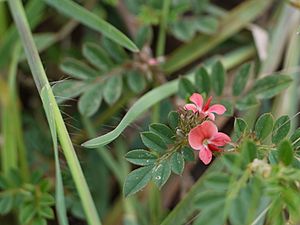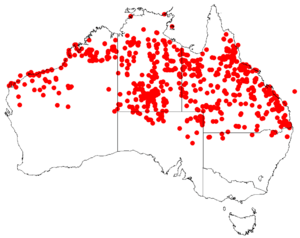Indigofera linnaei facts for kids
Quick facts for kids Indigofera linnaei |
|
|---|---|
 |
|
| Scientific classification | |
| Genus: |
Indigofera
|
| Species: |
linnaei
|
 |
|
| Australian occurrence data from Australasian Virtual Herbarium | |
| Synonyms | |
|
|
Indigofera linnaei, also called Birdsville indigo or nine-leaved indigo, is a type of legume plant. It's a small shrub that belongs to the Indigofera family, known as Fabaceae. The name Indigofera comes from Latin and means "carrying indigo," because some plants in this group were used to make a purple dye called indigo. The second part of its name, linnaei, honors a famous scientist named Carl Linnaeus.
This plant grows across many parts of Southeast Asia, including islands, and is very common in northern Australia.
Contents
Where Birdsville Indigo Grows
This plant is found in many countries around the world. You can find it in places like Assam, Bangladesh, China, India, Indonesia, Laos, Maldives, Myanmar, Nepal, Pakistan, Sri Lanka, Sudan, Thailand, and Vietnam.
It also grows widely in Australia. In Australia, it is found in Queensland, Western Australia, the Northern Territory, New South Wales, and South Australia.
What Birdsville Indigo Looks Like
Indigofera linnaei is a low-growing, woody plant. It usually spreads out flat on the ground, forming a mat up to 1.5 meters wide. It can also grow up to 45 centimeters tall. It has a long main root that goes deep into the soil.
Leaves and Stems
The plant's branches are covered with soft, white hairs. Its leaves are made up of smaller leaflets, usually 7 or 9 of them. These leaflets are about 8 to 15 millimeters long and 2 to 5 millimeters wide. They are shaped like an upside-down egg and have a small point at the tip. The leaves are soft and silky on both sides.
Flowers and Pods
The flowers grow in dense clusters, about 1 to 2 centimeters long. The flowers are red. The outer part of the flower, called the calyx, is covered with white hairs.
After the flowers bloom, small, oblong pods grow. These pods are about 3 to 7 millimeters long and are also silky. Each pod usually holds two seeds.
Where Birdsville Indigo Lives
In the Northern Territory of Australia, this plant often grows in areas that have been disturbed or where animals have grazed too much. It can grow in many different types of soil, from rocky ground and red sand to cracking clay. This plant flowers and produces fruit all year round.
In Western Australia, the Birdsville indigo flowers from January to May. It grows in sandy soils, on sandstone and limestone ridges, along rivers and creeks, and on rocky hillsides. Experts in Western Australia do not consider it a plant that is at risk of disappearing.

